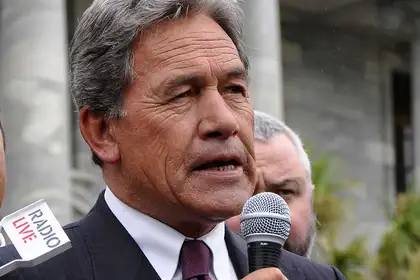
Will Winston Peter's benefit from anti-immigrant and nationalist sentiments?
By Associate Professor Grant Duncan
We hear a lot today about “post-truth politics” and distrust for established forms of expertise and political leadership. Some say that the system of government itself is “rigged” or “broken.” The question for New Zealand’s general election, this September, is what effect the anti-establishment sentiments we’ve seen in the UK, Europe and the United States may have here.
The UK’s Nigel Farage boldly declared “the beginning of a great global revolution” – yet it looks like the elections in the Netherlands and France don’t support his prediction – so far.
Unaffordable homes, homelessness, poverty and inequality are interlinked policy problems, and they are the most prominent election issues in New Zealanders’ minds. But how will they respond to these issues? With compassion, or resentment? Hope or distrust?
Disruptive, anti-establishment sentiments do surface among many “fed-up Kiwis”. The politician who benefits from that is (you guessed it) Winston Peters. Like Trump and Brexit supporters, Peters holds anti-immigrant and nationalist sentiments. And, like Trump, Peters prefers attacking the media to massaging them – unless they say things that support him.
The traditional left–right pendulum swing, which New Zealand has continued to experience under MMP, has pivoted largely around socio-economic issues and the role of the state. The fundamental shift that’s occurring now is between opposing poles of globalism and nationalism.
So, even Labour and National are now at pains to reduce net immigration numbers. This kind of “raise the draw-bridge” policy addresses an underlying desire to preserve traditional sources of social cohesion and employment. It also arises from a failure to build infrastructure fast enough to cope with recent population growth.

Associate Professor Grant Duncan.
Will Winston ride a wave of discontent?
Global economic competition, industrial restructuring, labour migration and constant exposure to unfamiliar ideas and practices cause frustration and insecurity. Those least equipped to take advantage of these changes (in general, those with little formal education and few transferable skills) are more likely to react with distrust and to support maverick political figures who announce that we can “take back control” of our nation’s destiny.
The associated voter backlash seen in the United States last year, for example, was propelled by loss of economic security and lack of opportunity. Competition from foreign economies, and from migrant workers, took the blame.
So, NZ First may do well this election, riding a similar wave of discontent, unless their rivals address it and neutralise it in advance.
We have yet to see whether this coming election will be dominated by a populist anti-establishment backlash. Such a reaction happened in 1993, putting NZ First in parliament and giving us MMP. We’ve also weathered the storm that polarised the nation in 2004 when Don Brash attacked policies “based on race”. (Brash was defeated in the subsequent election, don’t forget.)
So what about our democratic system of government? Is the system itself “broken”? Long gone are the days when many New Zealanders joined political parties. People argued vigorously over particular policies, but there was a trust in the basic institutions and an underlying sense of an enduring ‘deal’ between the citizen and the state.
The very nature of our public institutions, and the ways we relate to them, have radically changed, however, and will not stop changing. The young in particular – our next generation of leaders – are accustomed to quite different ways and means of doing business, getting to know one another, learning about events, and congregating as communities.
But rapidly changing global-digital networks are also disrupting the power dynamics that underlie them, and hence questions of political legitimacy and technical or economic expertise have become divisive and unsettled.
“The system” itself may not be entirely “broken”, but it is being broken up and re-formed. We are unable to predict exactly where this is leading, but we may need to be ready for more public disillusionment and party-political fragmentation, following trends overseas.
The political danger for a liberal and permissive society arises when a strong leader misleads the disaffected, saying that if you follow him, then “you can do anything”. And people vote with disillusionment and distrust in the forefront of their minds.
To end on a moderately positive note, international comparative evaluations rate New Zealand’s electoral and governmental systems very highly – among the best – for observing values such as human rights, freedoms and transparency.
MMP has not realised hopes that it would sustain high voter turnouts, but it gives us a moderate style of government and greater public satisfaction with democracy, in spite of its shortcomings. Perhaps those shortcomings include a “race to occupy the centre-ground”, and hence mediocrity – but surely that is better than authoritarian leadership or disruptive populism.
Associate Professor Grant Duncan is a lecturer in Massey University’s politics programme.